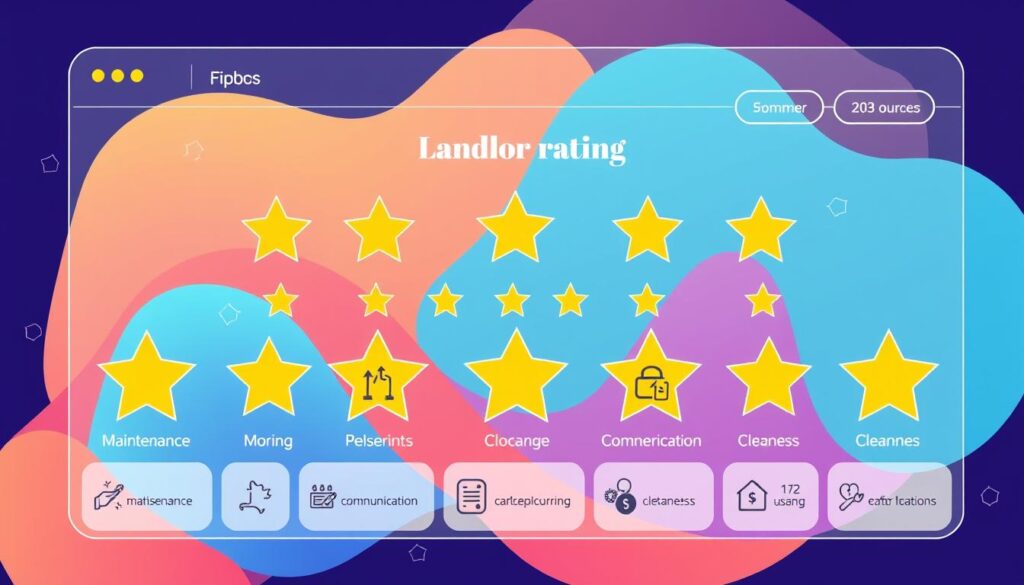Finding the perfect rental property can be thrilling yet overwhelming. Checking the landlord’s history and rental records is often overlooked but crucial. This guide will help you research property owners effectively.
You’ll learn how to protect yourself as a tenant. We’ll show you tools and strategies to uncover valuable insights. These insights will help you avoid potential problems before signing a lease.
Key Takeaways
- Understand the importance of tenant screening and checking landlord history to protect your rights as a renter
- Discover effective methods for conducting comprehensive landlord background checks and verifying rental records
- Learn how to identify potential red flags, such as recurring complaints and disputes, when researching property owners
- Explore online resources and public records that can provide valuable information about landlords and rental properties
- Gain insights into navigating landlord rating systems and communicating effectively with prospective landlords
The Importance of Checking Landlord History
Renting a property is a big decision. Investigating the landlord’s background is vital. Checking landlord history reveals their track record and how they handle tenant issues.
This information helps you make smart choices. It also protects your rights as a renter. Knowing your landlord’s past can prevent future problems.
Why Tenant Screening Matters
Screening a landlord is as crucial as tenant screening. It can uncover patterns of disputes or property neglect. A thorough landlord background check helps avoid potential issues later on.
Protecting Your Rights as a Renter
Understanding your rights and responsibilities as a renter is key. Checking landlord history can reveal red flags about their behavior. This knowledge empowers you to stand up for your rights.
“Thorough due diligence on a landlord can make all the difference in finding a positive and hassle-free rental experience.”
Checking landlord history and tenant screening are crucial steps. They help you make informed decisions about renting. These actions safeguard your rights as a renter.
Landlord Background Checks: A Comprehensive Approach
Rental property due diligence requires a thorough landlord background check. This involves verifying the property owner’s identity and examining their rental history. By gathering this info, you can make an informed decision before signing a lease.
Property owner verification is key in a landlord background check. It confirms who’s responsible for the rental property. Public records and reliable sources can help verify the landlord’s identity.
Reviewing the landlord’s rental history is crucial. Look for recurring complaints or disputes from previous tenants. Check for any legal issues or evictions that may have occurred.
Use online resources to streamline the landlord background check process. Tenant review platforms and local government websites offer insights into the landlord’s reputation. Thorough research helps you make a better decision and avoid future problems.
“Conducting a comprehensive landlord background check is a critical step in ensuring a positive rental experience.”
A thorough landlord background check is vital for rental property due diligence. It helps protect your rights as a renter. Verifying identity and assessing red flags leads to better decision-making.
Online Resources for Verifying Rental Property Owners
Verifying a landlord’s identity and rental history is essential when looking for a rental property. Online resources can provide valuable insights about a property owner’s track record. These tools help you assess their reliability and reputation.
Leveraging Public Records
Public records databases offer a wealth of information about a landlord’s background. These resources include property ownership details, court records, and criminal history. You can use this data to evaluate a landlord’s trustworthiness.
Tenant Review Platforms and Forums
Tenant review platforms and online forums are great tools for checking a landlord’s rental history. These sites feature firsthand accounts from current and former tenants. You can learn about a landlord’s responsiveness, maintenance standards, and treatment of renters.
| Online Resource | What You Can Find |
|---|---|
| Public Records Databases | Property ownership details, court records, criminal history |
| Tenant Review Platforms | Firsthand accounts of a landlord’s responsiveness, maintenance standards, and treatment of tenants |
Using these online resources helps you check landlord history effectively. You can make an informed decision about the rental property and its owner. This knowledge protects your rights as a renter.
check landlord history: A Crucial Step in Rental Due Diligence
Researching your potential landlord is vital for protecting your rights as a tenant. It reveals their track record and property management practices. This knowledge helps you avoid potential issues that could affect your rental experience.
Investigating a landlord’s background is key to rental property due diligence. It empowers you to make an informed choice. You can sidestep pitfalls that might threaten your tenant rights protection.
A landlord’s past can uncover valuable information. This includes previous tenant disputes, property maintenance issues, and compliance with housing regulations.
- Previous tenant complaints or disputes
- Property maintenance and repair issues
- Compliance with local housing regulations
- Responsiveness to tenant concerns
- Financial stability and ownership history
With this insight, you can decide if a landlord is right for you. You’ll be better equipped to protect your tenant rights. This knowledge can lead to a more positive rental experience.
| Landlord Attribute | Importance for Tenants |
|---|---|
| Property Maintenance Record | Indicates landlord’s commitment to keeping the rental in good condition |
| Tenant Satisfaction Levels | Reveals how well the landlord addresses tenant concerns and resolves issues |
| Financial Stability | Ensures the landlord can consistently meet their obligations and maintain the property |
Thoroughly checking a landlord’s history is crucial for a smooth rental experience. It helps you safeguard your tenant rights. You’ll be better prepared for a worry-free tenancy.

Red Flags to Watch Out For
Stay alert for red flags when checking rental properties. Look for a history of tenant complaints and disputes. These can show if a landlord ignores tenant rights or doesn’t address concerns properly.
Recurring Complaints and Disputes
Pay attention to patterns in past renters’ feedback. Common complaints can reveal a lot about a landlord’s behavior.
Look for issues like:
- Slow or inadequate response to maintenance requests
- Unfair or unjustified rent increases
- Aggressive or confrontational communication style
- Failure to address safety or habitability concerns
- Unreasonable or excessive security deposit deductions
Multiple similar complaints from different tenants are a warning sign. This may show poor landlord-tenant relations or disregard for tenant rights. Such info is vital for your rental property research.
“Conducting thorough research on a landlord’s history can save you from significant headaches down the road. Pay attention to any red flags that may indicate a pattern of unresolved issues or disregard for tenant rights.”
Navigating Landlord Rating Systems
Finding a rental property? Check the landlord’s reputation first. Online platforms offer landlord rating systems. These provide insights into a property owner’s performance and trustworthiness.
Use these ratings to make informed decisions about rental options. They can help you find a suitable landlord for your needs.
Understanding Rating Criteria
Landlord rating systems assess various aspects of property management. They look at tenant experiences too. Here are some common criteria:
- Responsiveness to tenant requests and concerns
- Timely repairs and maintenance
- Adherence to local housing laws and regulations
- Fairness in security deposit and rent practices
- Overall tenant satisfaction and feedback
Knowing these factors helps you evaluate a property owner’s suitability. You can match your rental needs with their proven abilities.
| Landlord Rating Criteria | Description |
|---|---|
| Responsiveness | How quickly and effectively the landlord addresses tenant requests and concerns. |
| Maintenance | The landlord’s commitment to timely repairs and upkeep of the rental property. |
| Compliance | The landlord’s adherence to local housing laws and regulations. |
| Tenant Satisfaction | The overall level of tenant satisfaction with the landlord’s management practices. |
Carefully review landlord rating systems. They offer valuable insights into property owners’ performance. This knowledge helps you choose a rental that meets your expectations.

Tenant Rights and Landlord Obligations
Understanding your tenant rights is vital for a positive rental experience. Tenant rights protection and landlord obligations create a framework for good rental property management. Knowing these legal requirements helps you safeguard your interests.
A key tenant right is a safe, livable home. Landlords must maintain properties in good condition. They should fix issues like broken appliances or pest problems quickly.
Landlords must follow local housing codes and regulations. This ensures the property meets basic health and safety standards.
- Landlords must provide a functional heating and cooling system, ensure the property is free from health and safety hazards, and address any necessary repairs in a timely manner.
- Tenants have the right to privacy and cannot be subjected to unreasonable entry or harassment by the landlord.
- Landlords must return the security deposit, or provide a detailed accounting of any deductions, at the end of the tenancy.
Being proactive about your rights can improve your rental experience. Familiarize yourself with local tenant rights protection laws. This knowledge helps ensure your landlord obligations are met.
“Knowing your rights as a tenant is the first step towards protecting yourself and creating a positive living environment.”
Communicating Concerns with Prospective Landlords
Addressing concerns about a landlord’s history or practices is vital. It can help resolve issues before signing a lease agreement. Open communication protects your rights and builds a positive relationship with your potential landlord.
Constructive Dialogue for Mutual Understanding
Focus on being solution-oriented when discussing concerns with a prospective landlord. Present your questions calmly and professionally. This shows your commitment to finding an agreeable resolution and builds trust.
Here are strategies for effective communication:
- Prepare a list of specific questions about landlord complaints or rental property management practices.
- Ask the landlord to clarify their policies and how they handle tenant-related matters.
- Inquire about their approach to tenant rights protection and willingness to ensure a positive experience.
- Discuss potential solutions that address your concerns while meeting the landlord’s needs.
Engaging in constructive dialogue shows your commitment to a beneficial arrangement. This sets the tone for a positive landlord-tenant relationship moving forward.
“Communication is the foundation of any successful landlord-tenant relationship. By addressing concerns openly and respectfully, both parties can work together to create a positive rental experience.”

| Key Strategies for Effective Communication | Benefits |
|---|---|
| Prepare a list of specific questions or issues | Demonstrates your proactiveness and attention to detail |
| Ask the landlord for clarification on policies and procedures | Helps establish a shared understanding of expectations |
| Inquire about the landlord’s approach to tenant rights protection | Ensures your rights as a tenant are prioritized |
| Discuss potential solutions or compromises | Fosters a collaborative and problem-solving mindset |
Rental Property Management Companies: Friend or Foe?
Rental property management companies play a crucial role in the rental landscape. Their impact on your rental experience can vary greatly. Your satisfaction depends on their service quality and how well they meet your needs.
These companies can benefit both landlords and tenants. They can handle the day-to-day responsibilities of property management, including rent collection, maintenance, and tenant screening. This allows landlords a hands-off approach while ensuring tenants receive prompt attention.
However, not all companies are equal. It’s vital to conduct thorough background checks and verify property owners. This ensures you’re working with a reputable and trustworthy organization.
Some companies may favor landlords over tenants. This can lead to conflicts or slow responses to tenant concerns. Research the company’s track record and read reviews from other tenants.
Understand their policies and procedures before signing a lease agreement. This will help you make an informed decision.
“Choosing the right rental property management company can make all the difference in your rental experience. Do your due diligence to ensure they are a true partner, not a foe.”
Your specific needs and experiences determine if a company is a friend or foe. Thoroughly vetting these companies helps ensure a positive rental journey. It allows you to make choices that align with your priorities.
Staying Informed: Subscribing to Rental News and Updates
Tenants need to stay informed about rental property management industry developments. Subscribing to rental news keeps you aware of changes affecting your tenant rights protection. It also helps you understand landlord obligations that impact your living situation.
Keeping Up with Changing Regulations
The rental market constantly evolves with new laws to protect tenants’ rights. These regulations also address rental property management professionals’ responsibilities. Reliable news sources can help you understand your rights and make smart choices.
Staying informed lets you address concerns proactively. This ensures a positive rental experience. Remember, knowledge is power in navigating the rental market’s complexities.
- Discover updates to local, state, and federal laws governing tenant rights protection and landlord obligations.
- Stay informed about new programs or initiatives aimed at improving rental property management practices.
- Learn about industry trends and how they may impact your rental experience.
“Staying up-to-date with rental news and regulations is essential for protecting your rights as a tenant and maintaining a healthy relationship with your landlord.”

| Rental News Source | Key Features | Subscription Options |
|---|---|---|
| Rental Housing Journal | Comprehensive coverage of industry trends, legal updates, and best practices | Free online subscription, paid print edition |
| National Apartment Association | Advocacy, education, and resources for rental property management professionals | Free online membership, paid premium membership |
| Rental Property Owner Magazine | Practical advice and insights for landlords and rental property management companies | Free online subscription, paid print edition |
Being informed and proactive safeguards your tenant rights. It also ensures a positive rental property management experience. Stay updated to enjoy a smooth rental journey.
Building a Positive Renter-Landlord Relationship
A good relationship with your landlord is key for a smooth rental experience. Open communication and respect create a win-win situation for both parties. Effective rental property management thrives on this teamwork approach.
Know your landlord’s tenant rights protection policies. Read your lease agreement carefully and follow your responsibilities as a tenant. This shows you’re a reliable resident, earning your landlord’s trust.
Talk with your landlord regularly. Address concerns quickly and work together to find solutions. This helps prevent misunderstandings and builds a partnership. Be responsive to reasonable requests from your landlord.
Keep the property in good shape. This contributes to positive landlord rating systems. A respectful relationship with your landlord leads to a stable rental experience.
Remember, a good renter-landlord dynamic benefits everyone. It can result in a long-term, mutually beneficial arrangement.
“The key to a successful rental relationship is mutual understanding and respect. When both parties work together, the outcome is often a win-win situation.”
| Strategies for Building a Positive Renter-Landlord Relationship | Benefits |
|---|---|
|
|
Legal Recourse for Problematic Landlords
Knowing your rights as a tenant is vital. It’s important to understand your legal options when dealing with negligent landlords. This knowledge can help you handle disputes during your rental experience.
Knowing Your Rights and Options
Familiarize yourself with landlord obligations in your rental agreement and local housing laws. This will help you spot any neglect of responsibilities or rights violations.
Review your lease to understand landlord duties and tenant rights. Research tenant protection laws in your area. Document any issues with your landlord’s actions or inactions.
- Carefully review your lease agreement to understand the landlord’s obligations and your rights as a tenant.
- Research the applicable tenant protection laws in your state or municipality to ensure your landlord is complying with the regulations.
- Document any issues or concerns you have with your landlord’s actions or inactions, such as failure to make timely repairs or comply with safety standards.
Consider legal recourse if informal attempts to resolve issues fail. This may involve filing a complaint with housing authorities. You might also seek legal counsel to explore options like lawsuits or mediation.
“Knowing your rights as a tenant and the legal remedies available can empower you to hold your landlord accountable and ensure a fair and positive rental experience.”
Stay informed and document all incidents to address problematic landlords effectively. Be prepared to take legal steps to protect your tenant rights protection. This approach can help you navigate challenges and work towards fair resolutions.
Conclusion
Checking a landlord’s history is crucial in the tenant screening process. It helps you make informed decisions and protects your rights as a renter. This research ensures a positive rental experience.
Understanding check landlord history, tenant screening, and rental property due diligence is vital for all renters. Online resources and public records can reveal valuable insights about a landlord’s reputation.
Safeguarding your tenant rights should be your top priority. Stay vigilant and communicate effectively with potential landlords. Be proactive in your research to navigate the rental landscape confidently.

